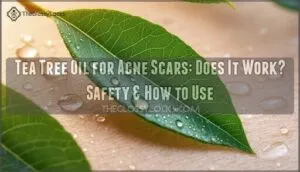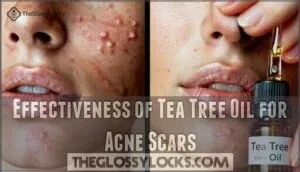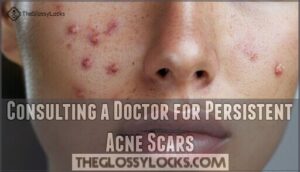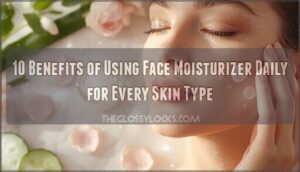This site is supported by our readers. We may earn a commission, at no cost to you, if you purchase through links.

While this natural antiseptic can’t fade existing scars, it excels at preventing new breakouts that create more scarring down the road.
Think of it as your skin’s bodyguard rather than its plastic surgeon.
The oil’s antimicrobial properties help keep acne-causing bacteria in check, but research on actual scar reduction remains thin.
You’ll need to dilute it properly since full strength can irritate your skin worse than a sunburn.
For real scar improvement, you’re looking at professional treatments like chemical peels or laser therapy instead.
Table Of Contents
- Key Takeaways
- Effectiveness of Tea Tree Oil for Acne Scars
- Safety Considerations for Using Tea Tree Oil
- How to Use Tea Tree Oil for Acne Scars
- Other Tea Tree Oil Acne Treatments
- Consulting a Dermatologist for Acne Scars
- Medical Treatments for Acne Scars
- Home Remedies for Acne Scars
- Consulting a Doctor for Persistent Acne Scars
- Frequently Asked Questions (FAQs)
- What is the best oil for acne scars?
- What oil is best for acne scars?
- Can I apply tea tree oil directly on acne?
- Can tea tree oil treat acne scars?
- What is the best way to get rid of acne scars?
- Is tea tree oil good for acne?
- Can tea tree & lavender oil treat acne?
- Does tea tree oil help irritated skin?
- What are the side effects of tea tree oil?
- Can tea tree oil treat both acne and scars?
- Conclusion
Key Takeaways
- You can’t expect tea tree oil to fade existing acne scars since research on scar reduction remains limited, but it works well as your skin’s bodyguard against future breakouts that create more scarring.
- You’ll need to dilute tea tree oil properly with carrier oils like jojoba or coconut oil at a 1:12 ratio since undiluted application can cause severe irritation, burning, and allergic reactions.
- You’re better off using tea tree oil for prevention rather than treatment – its antimicrobial properties excel at controlling acne-causing bacteria and stopping new breakouts before they turn into permanent scars.
- You should consult a dermatologist for stubborn acne scars since professional treatments like chemical peels, laser therapy, and microneedling deliver proven results that home remedies can’t match.
Effectiveness of Tea Tree Oil for Acne Scars
You’ve probably heard that tea tree oil works wonders for active acne breakouts, but its effectiveness for treating existing acne scars remains unclear due to limited research.
While tea tree oil’s antimicrobial and anti-inflammatory properties can help prevent future scarring by controlling active breakouts, studies specifically examining its ability to reduce established scars are inconclusive.
Tea Tree Oil Has Antimicrobial and Anti-inflammatory Properties
In the context of fighting acne and potentially reducing scars, tea tree oil’s antimicrobial and anti-inflammatory powerhouse properties make it a standout natural remedy.
This Australian native extract contains potent terpene composition that targets acne bacteria while promoting skin healing.
Here’s how tea tree oil works its magic on your skin:
- Antimicrobial mechanisms destroy Propionibacterium acnes, the primary culprit behind breakouts
- Anti-inflammatory effects reduce redness and swelling around existing blemishes
- Skin benefits include unclogging pores and preventing future scarring
The oil’s natural astringent qualities help balance sebum production without over-drying your skin.
While these properties make tea tree oil excellent for active acne treatment, its direct impact on existing acne scars requires more investigation.
Evidence on Treating Existing Acne Scars is Limited
While tea tree oil shows clear benefits for active acne, you’ll find the research on existing acne scars tells a different story.
Research on tea tree oil for existing scars? The evidence is surprisingly thin—most studies focus on prevention, not treatment.
The evidence is surprisingly thin, with most studies focusing on preventing new breakouts rather than treating established scarring.
Here’s what researchers have found so far:
| Research Area | Current Evidence |
|---|---|
| Atrophic scars | Very limited data |
| Hypertrophic scars | Some promising results |
| Long-term scar reduction | Insufficient studies |
| Scar appearance improvement | Mixed anecdotal reports |
Scar type matters when considering tea tree oil for acne scar removal.
Research limitations mean you’re working with incomplete information about skin healing and scar reduction effectiveness.
While some people report improved scar appearance, scientists need more rigorous studies to confirm tea tree oil’s true potential for acne scars.
Safety Considerations for Using Tea Tree Oil
Before you start applying tea tree oil to your acne scars, you’ll need to understand the safety basics to protect your skin from irritation.
Pure tea tree oil can cause redness, burning, and even allergic reactions if you don’t dilute it properly or skip the patch test that dermatologists recommend.
Proper Dilution Methods
Never apply undiluted tea tree oil directly to your skin—it’s like using paint thinner on a canvas.
Always mix it with carrier oils like jojoba, coconut, or sweet almond oil.
The golden rule for dilution ratios: combine 1-2 drops of tea tree oil with one teaspoon of carrier oil.
This prevents skin irritation while maintaining effectiveness for acne scars.
Proper skincare routines also help to reduce skin sensitivity.
Patch Testing Importance
After establishing proper dilution ratios with your carrier oil, you’ll need to patch test before applying tea tree oil anywhere near your acne scars.
Think of it as your skin’s dress rehearsal—better to catch problems early than deal with a full-face disaster later.
Apply your diluted mixture to a small area and watch for these irritation signs:
- Redness or burning sensation
- Itchy, raised bumps or hives
- Excessive dryness or peeling
- Swelling around the test area.
Wait 24 hours to confirm no allergic reaction occurs.
Many people also use specific oils for testing to guarantee accurate results.
Overuse Risks
Overdoing it with tea tree oil can backfire spectacularly.
Too much creates irritation potential and redness concerns that’ll make your skin angrier than before.
Worse yet, excessive use might trigger scar worsening instead of healing.
| Overuse Risk | What Happens |
|---|---|
| Dryness Effects | Skin becomes flaky, tight |
| Allergic Reactions | Rash, hives develop |
| Side Effects | Burns, stings worsen |
Moderation prevents these pitfalls completely.
How to Use Tea Tree Oil for Acne Scars
When applying tea tree oil for acne scars, you’ll want to follow proper dilution ratios and application frequency for safe scar treatment.
Start by cleansing your face, then mix tea tree oil with carrier oils like jojoba or rosehip at a 1:12 ratio. This gentle approach works on various scar types while protecting your skin.
A nutrient-rich diet can also support healthy skin and healing.
Here’s your step-by-step guide:
- Clean your face thoroughly before any application
- Mix properly – 12 drops carrier oil per 1 drop tea tree oil
- Patch test on your inner wrist first
- Apply twice daily using a cotton pad on post acne scars
- Choose quality products – look for 100% pure tea tree for skin benefits
Other Tea Tree Oil Acne Treatments
Beyond spot treatments, you can harness tea tree oil’s acne benefits through various products.
Tea tree cleansers remove daily buildup while fighting breakouts. Tea tree toners balance skin pH and target pores.
Tea tree masks provide intensive acne treatment sessions. Overnight serums work while you sleep, potentially helping with acne scars.
Each method offers unique advantages for thorough tea tree oil skincare routines.
Consulting a Dermatologist for Acne Scars
While tea tree oil shows promise for active acne, you might find it falls short when tackling stubborn acne scars.
That’s when seeing a dermatologist becomes your smartest move. These skin specialists don’t just guess – they evaluate your scar severity, analyze your skin type, and create personalized plans that actually work.
Think of it like getting a custom roadmap instead of wandering around lost. Your dermatologist will set realistic expectations and explain which treatment options make sense for your specific situation. They’ve seen it all and know what delivers results versus what wastes your time and money.
Here’s what makes professional consultation worthwhile:
- Expert assessment of your scar type and skin condition determines the most effective approach
- Access to advanced treatments like prescription medications and professional procedures unavailable over-the-counter
- Realistic timeline helps you understand when you’ll see improvements and avoid disappointment.
Dermatologists might suggest topical retinoid application for effective treatment. Don’t let acne scars control your confidence any longer.
Medical Treatments for Acne Scars
When tea tree oil doesn’t provide the results you’re looking for, medical treatments offer more powerful options to address stubborn acne scars.
These professional procedures, including laser treatments, chemical peels, and dermabrasion, can effectively target deeper scarring that home remedies can’t reach.
Dermabrasion (laser or Rotating Device)
Dermabrasion removes your skin’s top layer using a rotating wire brush, making it highly effective for shallow boxcar and rolling acne scars.
This scar treatment requires careful consideration of Dermabrasion Candidates, as Dermabrasion Risks include prolonged redness.
Dermabrasion Cost varies widely, while Dermabrasion Recovery involves months of healing.
Dermabrasion Results show significant improvement in facial scars, though laser therapy offers similar benefits.
For smoother skin, consider radiofrequency skin tightening.
Laser Treatments (ablative and Non-ablative)
Laser therapy offers powerful scar treatment options through two main approaches.
Ablative lasers remove skin layers completely, delivering dramatic results for boxcar and rolling scars but requiring longer recovery. Non-ablative lasers work beneath the surface, stimulating collagen with minimal downtime.
Consider these factors when choosing laser resurfacing:
- Cost vs. results – Ablative treatments cost more but show faster improvement
- Recovery time – Fractional lasers offer middle-ground healing
- Skin tone safety – Some lasers risk hyperpigmentation on darker skin
Chemical Peels
Chemical peels use acids to resurface skin and reduce acne scars effectively. Your dermatologist will select appropriate acid concentrations based on your skin type and scar severity. Results may take up to nine months to become visible, but evidence shows they help reduce scar depth substantially.
- Peel types: Superficial peels target mild scars, while deeper peels address more severe skin discoloration
- Skin preparation: Proper pre-treatment conditioning minimizes potential risks like hyperpigmentation
- Post-peel care: Following dermatologist instructions prevents complications and optimizes healing results
Subcision
While chemical peels resurface skin from above, subcision works beneath the surface.
This subcision technique uses a specialized needle to break fibrous bands pulling down rolling scars.
The procedure releases tethered tissue, allowing natural skin regeneration.
Though tea tree oil and other natural remedies help prevent new acne scars, stubborn existing scars often need combination therapies with professional treatments to reduce scarring effectively.
Punch Techniques (excision, Grafting, Elevation)
Punch techniques target stubborn acne scars through precise surgical methods.
Punch excision details involve removing scar tissue completely, while grafting success rates improve when healthy skin replaces damaged areas.
Elevation complications can occur when raising sunken scars.
Technique combinations often yield better scarring outcomes than single treatments.
These procedures require skilled dermatologists for ideal skin regeneration results.
Home Remedies for Acne Scars
You’ll find many home remedies for acne scars that promise quick results, though most lack strong scientific evidence to back their claims.
These natural treatments, including essential oils like tea tree and helichrysum, along with household items like honey and lemon juice, may offer gentle support for your skin’s healing process when used correctly, and can be considered as natural treatments.
Essential Oils (tea Tree, Helichrysum, Geranium, Lavender, Neroli)
Several essential oils tackle acne scars through different mechanisms. Tea tree oil’s antimicrobial properties fight bacteria, while helichrysum promotes skin regeneration.
Here’s how these natural scar treatments work:
- Lavender oil calms inflammation and supports tissue growth
- Geranium oil balances skin tone and reduces blemishes
- Neroli oil contains cell regeneration properties for scar reduction
Always dilute with carrier oils before application. Many users find helichrysum oil effective for scar treatment.
Other Oils (coconut, Shea Butter, Aloe Vera, Honey)
Beyond tea tree oil, several natural oils pack serious punch for acne scar treatment.
These gentle alternatives work alongside your existing skin care routine:
- Coconut Oil – Deep moisturization helps fade scars while preventing new breakouts
- Shea Butter – Rich vitamins promote cellular regeneration and healing
- Aloe Vera Gel – Anti-inflammatory properties soothe irritated skin naturally
- Honey Properties – Antibacterial action supports natural scar treatment processes
Many people find coconut oil effective for scar reduction.
Baking Soda Pastes, Lemon Juice, Apple Cider Vinegar
While these DIY treatments sound promising, they come with serious caveats.
Baking soda can disrupt your skin’s natural pH balance, and lemon juice may cause irritation or burns. Apple cider vinegar requires careful dilution to avoid chemical burns.
| Treatment | Potential Benefits | Risks |
|---|---|---|
| Baking Soda | Mild exfoliation, antiseptic properties | pH imbalance, irritation, over-drying |
| Lemon Juice | Natural acids may fade pigmentation | Photosensitivity, burns, severe irritation |
| Apple Cider Vinegar | Antibacterial, mild exfoliant | Chemical burns if undiluted, skin damage |
Dermatologists generally discourage these scar lightening methods due to unpredictable results and safety concerns.
Combination Approaches May Be Necessary for Best Results
While single remedies like baking soda or apple cider vinegar help, you’ll often need synergistic treatments for stubborn acne scars.
A multi-pronged approach combining tea tree oil with other combination methods creates more effective holistic skincare.
Treatment layering allows personalized regimens that target different aspects of scarring. Think of it as assembling your dream team for acne treatment success.
Consulting a Doctor for Persistent Acne Scars
If you’ve been using tea tree oil and other home remedies for several months without seeing meaningful improvement in your acne scars, it’s time to schedule an appointment with a dermatologist.
A skin specialist can evaluate your specific scar type and recommend professional treatments like laser therapy, chemical peels, or microneedling that often work more effectively than at-home solutions.
Seek Professional Guidance for Stubborn or Severe Acne Scarring
When home remedies fall short, don’t keep fighting acne scars alone.
Severe scarring demands professional expertise that goes beyond what you can achieve at home.
A dermatologist can distinguish between hypertrophic scars and atrophic scars, then recommend targeted treatment options like laser therapy or cosmetic procedures.
Professional intervention timing matters—waiting too long limits your options.
Dermatologists Can Provide Personalized Treatment Recommendations
When stubborn acne scars won’t budge, a dermatologist becomes your skin’s best ally.
They’ll conduct a thorough scar type assessment and develop personalized scar plans customized to your unique needs.
Through treatment plan customization, they’ll recommend the most effective professional treatment options for acne scar reduction, combining individualized skincare advice with proven acne scar treatment methods.
Early Intervention Improves The Chances of Successful Scar Reduction
Time works in your favor when treating acne scars.
Early treatment and inflammation control substantially improve acne scar healing outcomes compared to waiting months or years.
Preventative skincare that focuses on minimizing breakouts reduces your risk of scarring from the start.
The sooner you address active acne and begin acne scar prevention strategies, the better your chances of successful acne scar reduction.
Frequently Asked Questions (FAQs)
What is the best oil for acne scars?
While tea tree oil tackles active breakouts effectively, it won’t erase existing scars.
You’ll need stronger alternatives like retinol, vitamin C, or professional treatments such as microneedling for actual scar reduction.
What oil is best for acne scars?
Several oils can help with acne scars, but rosehip seed oil stands out as the top choice.
You’ll find it’s rich in vitamin C and essential fatty acids that promote skin regeneration and fade scarring effectively.
Can I apply tea tree oil directly on acne?
No, you shouldn’t apply pure tea tree oil directly on acne.
Always dilute it with a carrier oil first—about 12 drops per ounce.
Undiluted tea tree oil can cause irritation, redness, and burning.
Can tea tree oil treat acne scars?
Notably, while tea tree oil effectively treats active acne, research on existing scars remains limited.
You might see improvement in raised scars, but don’t expect miracles for deeper, atrophic scars below your skin’s surface, particularly for atrophic scars.
What is the best way to get rid of acne scars?
Professional treatments like chemical peels, microneedling, and laser therapy work best for stubborn acne scars. You’ll see faster results with dermatologist-recommended procedures than over-the-counter options, though patience remains key regardless.
Is tea tree oil good for acne?
Yes, tea tree oil’s proven effective for mild to moderate acne.
You’ll see reduced inflammation and fewer breakouts when you use it consistently.
It’s gentler than benzoyl peroxide but just as effective.
Can tea tree & lavender oil treat acne?
Sarah tried combining tea tree and lavender oils for her stubborn breakouts.
Both oils contain antimicrobial compounds that fight acne-causing bacteria.
You’ll find tea tree more potent for active pimples, while lavender soothes inflammation effectively, and tea tree is noted for its potency.
Does tea tree oil help irritated skin?
Tea tree oil’s anti-inflammatory properties can soothe irritated skin by reducing redness and swelling.
However, you’ll need to dilute it properly with carrier oil, as undiluted application may actually worsen irritation, which is why proper dilution is crucial.
What are the side effects of tea tree oil?
You might experience mild irritation, redness, or dryness when using tea tree oil topically. It’s toxic if swallowed and can cause severe reactions if used undiluted, so always dilute properly.
Can tea tree oil treat both acne and scars?
Like a double-edged sword, tea tree oil effectively treats active acne breakouts but shows limited evidence for existing scars.
You’ll see better results using it to prevent new breakouts than to fade old marks.
Conclusion
Surprisingly, tea tree oil for acne scars works better as prevention than cure.
You’ll find it most effective at stopping new breakouts that create future scarring, rather than erasing existing marks.
While its antimicrobial properties can’t perform miracles on established scars, proper dilution and consistent use may support your skin’s healing process.
For stubborn scarring, you’re better off consulting a dermatologist about professional treatments like chemical peels or laser therapy that deliver proven results.
- https://greatist.com/health/tea-tree-oil-for-acne-scars
- https://www.exposedskincare.com/blogs/blog/how-to-dilute-tea-tree-oil-for-acne
- https://www.theindependentpharmacy.co.uk/acne/guides/how-to-get-rid-of-acne-scars
- https://www.reddit.com/r/Skincare_Addiction/comments/nbk1x4/does_tea_tree_oil_help_with_acne_or_acne_scars/
- https://www.stratumclinics.com/a-guide-to-tea-tree-oil-and-using-it-for-acne-spots/













